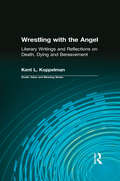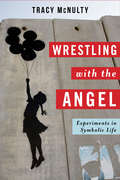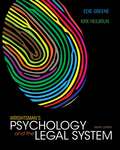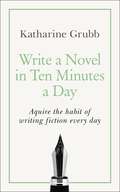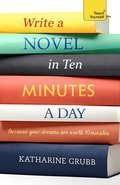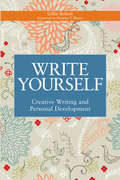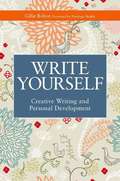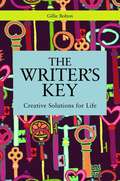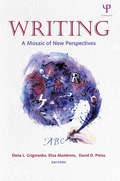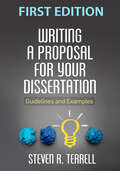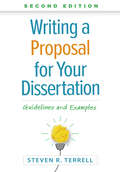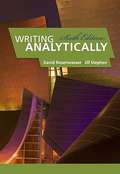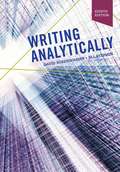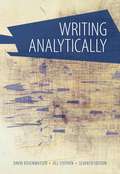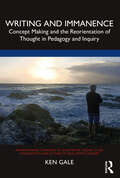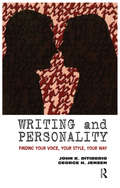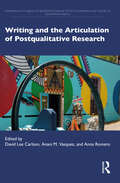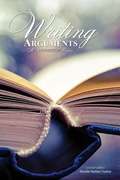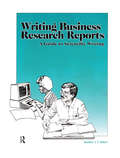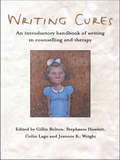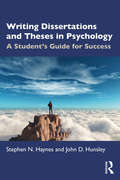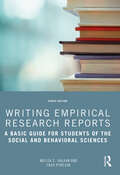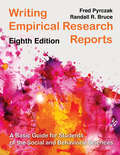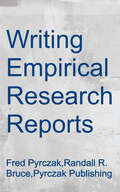- Table View
- List View
Wrestling with the Angel: Literary Writings and Reflections on Death, Dying and Bereavement (Death, Value and Meaning Series)
by Kent L. Koppelman Dale A. LundWrestling with the Angel addresses the human struggle to cope with death, dying, grief, and bereavement. The book includes essays, a one-act play, a short story, and poetry, including shape poems, rhyming, structured verse, and free verse. In the one-act play, an angel of death comes for a man who has lived an unexamined life and wants to explain why he is not prepared to leave. The short story offers a humorous look at a man who resists aging by continuing to view himself as the young man he once was. The diverse genres allow for different ways of exploring these issues, but all are intended to engage the reader's emotions as well as intellect. The writings incorporate reflections and quotations addressing common human issues related to our mortality and explore reactions to the loss of a loved one--whether expected, such as the death of an aging parent or someone with a terminal illness, or unexpected, such as accidental death. The final chapters examine how aging causes us to assess our lives and why preparing ourselves for death can enhance the quality of our life. This is a book with many more questions than answers, but the reader is invited to share in the process of finding answers. It is a book that requires the reader to be comfortable with ambiguity, because the reality it describes is often ambiguous--a reality that presents us with many choices but few certainties. Intended Audience: Scholars, hospice workers, funeral home directors, hospital chaplains, ministers, and others who work with bereavement issues; classes in death education and classes for mental health professionals in death and grief; general readers who have suffered the loss of a loved one.
Wrestling with the Angel: Experiments in Symbolic Life (Insurrections: Critical Studies in Religion, Politics, and Culture)
by Tracy McNultyWrestling with the Angel is a meditation on contemporary political, legal, and social theory from a psychoanalytic perspective. It argues for the enabling function of formal and symbolic constraints in sustaining desire as a source of creativity, innovation, and social change.The book begins by calling for a richer understanding of the psychoanalytic concept of the symbolic and the resources it might offer for an examination of the social link and the political sphere. The symbolic is a crucial dimension of social coexistence but cannot be reduced to the social norms, rules, and practices with which it is so often collapsed. As a dimension of human life that is introduced by language—and thus inescapably "other" with respect to the laws of nature—the symbolic is an undeniable fact of human existence. Yet the same cannot be said of the forms and practices that represent and sustain it. In designating these laws, structures, and practices as "fictions," Jacques Lacan makes clear that the symbolic is a dimension of social life that has to be created and maintained and that can also be displaced, eradicated, or rendered dysfunctional. The symbolic fictions that structure and support the social tie are therefore historicizable, emerging at specific times and in particular contexts and losing their efficacy when circumstances change. They are also fragile and ephemeral, needing to be renewed and reinvented if they are not to become outmoded or ridiculous. Therefore the aim of this study is not to call for a return to traditional symbolic laws but to reflect on the relationship between the symbolic in its most elementary or structural form and the function of constraints and limits.McNulty analyzes examples of "experimental" (as opposed to "normative") articulations of the symbolic and their creative use of formal limits and constraints not as mere prohibitions or rules but as "enabling constraints" that favor the exercise of freedom. The first part examines practices that conceive of subjective freedom as enabled by the struggle with constraints or limits, from the transference that structures the "minimal social link" of psychoanalysis to constrained relationships between two or more people in the context of political and social movements. Examples discussed range from the spiritual practices and social legacies of Moses, Jesus, and Teresa of Avila to the political philosophy of Hannah Arendt and Jacques Rancière. The second part is devoted to legal and political debates surrounding the function of the written law. It isolates the law's function as a symbolic limit or constraint as distinct from its content and representational character. The analysis draws on Mosaic law traditions, the political theology of Paul, and twentieth-century treatments of written law in the work of Carl Schmitt, Walter Benjamin, Sigmund Freud, Pierre Legendre, and Alain Badiou. In conclusion, the study considers the relationship between will and constraint in Kant's aesthetic philosophy and in the experimental literary works of the collective Oulipo.
Wrightsman's Psychology and the Legal System
by Edie Greene Kirk HeilbrunWRIGHTMAN'S PSYCHOLOGY AND THE LEGAL SYSTEM shows you the critical importance of psychology's concepts and methods to the functioning of many aspects of today's legal system. Featuring topics such as competence to stand trial, the insanity defense, expert forensic testimony, analysis of eye witness identification, criminal profiling, and many others, this best-selling book gives you a comprehensive overview of psychology's contributions to the legal system, and the many roles available to trained psychologists within the system.
Write a Novel in 10 Minutes a Day: Acquire the habit of writing fiction every day
by Katharine GrubbLEARN HOW TO WRITE FICTION BY WRITING EVERY DAYWould you like to write but have no spare time?Do you not know where to begin?Write A Novel In 10 Minutes A Day will help you sculpt a full-length piece of creative writing in just ten minutes a day. Starting with a daily practical exercise, it will help you manage your writing schedule within this time frame and help you bring your novel to life. You will be able to clarify your vision and review your time commitments, as well as understand your own abilities. Learning to observe the world around you, write quickly and tap into your unique voice will help you to create all the elements of your story and, by the time you've finished all the exercises, you'll have created something beautiful.ABOUT THE SERIESThe Teach Yourself Creative Writing series helps aspiring authors tell their story. Covering a range of genres from science fiction and romantic novels, to illustrated children's books and comedy, this series is packed with advice, exercises and tips for unlocking creativity and improving your writing. And because we know how daunting the blank page can be, we set up the Just Write online community at tyjustwrite, for budding authors and successful writers to connect and share.
Write a Novel in 10 Minutes a Day: Acquire the habit of writing fiction every day
by Katharine GrubbLEARN HOW TO WRITE FICTION BY WRITING EVERY DAYWould you like to write but have no spare time?Do you not know where to begin?Write A Novel In 10 Minutes A Day will help you sculpt a full-length piece of creative writing in just ten minutes a day. Starting with a daily practical exercise, it will help you manage your writing schedule within this time frame and help you bring your novel to life. You will be able to clarify your vision and review your time commitments, as well as understand your own abilities. Learning to observe the world around you, write quickly and tap into your unique voice will help you to create all the elements of your story and, by the time you've finished all the exercises, you'll have created something beautiful.ABOUT THE SERIESThe Teach Yourself Creative Writing series helps aspiring authors tell their story. Covering a range of genres from science fiction and romantic novels, to illustrated children's books and comedy, this series is packed with advice, exercises and tips for unlocking creativity and improving your writing. And because we know how daunting the blank page can be, we set up the Just Write online community at tyjustwrite, for budding authors and successful writers to connect and share.
Write a Novel in 10 Minutes a Day: Acquire the habit of writing fiction every day
by Katharine GrubbLEARN HOW TO WRITE FICTION BY WRITING EVERY DAYWould you like to write but have no spare time?Do you not know where to begin?Write A Novel In 10 Minutes A Day will help you sculpt a full-length piece of creative writing in just ten minutes a day. Starting with a daily practical exercise, it will help you manage your writing schedule within this time frame and help you bring your novel to life. You will be able to clarify your vision and review your time commitments, as well as understand your own abilities. Learning to observe the world around you, write quickly and tap into your unique voice will help you to create all the elements of your story and, by the time you've finished all the exercises, you'll have created something beautiful.ABOUT THE SERIESThe Teach Yourself Creative Writing series helps aspiring authors tell their story. Covering a range of genres from science fiction and romantic novels, to illustrated children's books and comedy, this series is packed with advice, exercises and tips for unlocking creativity and improving your writing. And because we know how daunting the blank page can be, we set up the Just Write online community at tyjustwrite, for budding authors and successful writers to connect and share.
Write Yourself
by Gillie BoltonWrite Yourself is the ideal introduction to how to facilitate groups and individuals in finding inspiration for their creative personal writing voices. This book explains how and why writing is such an illuminative, healing, and cathartic process, and provides many practical exercises that encourage the exploration of emotions, memories and experiences. Chapters cover the use of writing with a variety of client groups, including those made up of people suffering from depression, anxiety or health problems, and advice is given both on running and participating in successful writing groups. This book will be an invaluable resource for professionals working across the health, social care and caring professions, arts therapists and for everyone interested in the therapeutic qualities of creative writing.
Write Yourself: Creative Writing and Personal Development
by Gillie BoltonWrite Yourself is the ideal introduction to how to facilitate groups and individuals in finding inspiration for their creative personal writing voices. This book explains how and why writing is such an illuminative, healing, and cathartic process, and provides many practical exercises that encourage the exploration of emotions, memories and experiences. Chapters cover the use of writing with a variety of client groups, including those made up of people suffering from depression, anxiety or health problems, and advice is given both on running and participating in successful writing groups. This book will be an invaluable resource for professionals working across the health, social care and caring professions, arts therapists and for everyone interested in the therapeutic qualities of creative writing.
The Writer's Key: Introducing Creative Solutions for Life
by Gillie BoltonThe Writer's Key is a complete beginner's guide to writing for self-reflection and personal development. Creative writing can deepen our understanding of ourselves and our lives. This book unlocks the potential for gaining these insights, widening perspectives, finding new positivity, increasing confidence and reducing stress through writing. It: - introduces creative writing as a very enjoyable process for enabling reflective personal and professional development - provides strategies and inspiration for getting started, continuing despite hesitations and getting the most out of writing - features uplifting accounts of individuals' successful use of the Key for self-exploration and development through creative writing. The Writer's Key assumes no prior writing experience and will inspire and encourage anyone who wants to tell and explore their story, whether they feel trapped by issues at work or home because of loss, trauma or relationships, or simply want to make more of life.
Writing: A Mosaic of New Perspectives
by Elena L. Grigorenko Elisa Mambrino David D. PreissThis book captures the diversity and richness of writing as it relates to different forms of abilities, skills, competencies, and expertise. Psychologists, educators, researchers, and practitioners in neighboring areas are interested in exploring how writing develops and in what manner this development can be fostered, but they lack a handy, unified, and comprehensive source of information to satisfy their interest. The goal of this book is to fill this void by reflecting on the phenomenon of writing from a developmental perspective. It contains an integrated set of chapters devoted to issues of writing: how writing develops, how it is and should be taught and how writing paths of development differ across writing genres. Specifically, the book addresses typologies of writing; pathways of the development of writing skills; stages of the development of writing; individual differences in the acquisition of writing skills; writing ability and disability; teaching writing; and the development and demonstration of expertise in writing.
Writing a Proposal for Your Dissertation
by Steven R. TerrellThis user-friendly guide helps students get started on--and complete--a successful doctoral dissertation proposal by accessibly explaining the process and breaking it down into manageable steps. Steven R. Terrell demonstrates how to write each chapter of the proposal, including the problem statement, purpose statement, and research questions and hypotheses; literature review; and detailed plan for data collection and analysis. Of special utility, end-of-chapter exercises serve as building blocks for developing a full draft of an original proposal. Numerous case study examples are drawn from across the social, behavioral, and health science disciplines. Appendices present an exemplary proposal written three ways to encompass quantitative, qualitative, and mixed-methods designs. Pedagogical Features: *"Let's Start Writing" exercises leading up to a complete proposal draft. *"Do You Understand?" checklists of key terms plus an end-of-book glossary. *End-of-chapter quizzes with answers. *Case study examples from education, psychology, health sciences, business, and information systems. *Sample proposal with three variants of the methods chapter: quantitative, qualitative, and mixed methods.
Writing a Proposal for Your Dissertation: Guidelines and Examples
by Steven R. TerrellThe encouraging book that has guided thousands of students step by step through crafting a strong dissertation proposal is now in a thoroughly revised second edition. It includes new guidance for developing methodology-specific problem statements, an expanded discussion of the literature review, coverage of the four-chapter dissertation model, and more. Terrell demonstrates how to write each chapter of the proposal, including the problem statement, purpose statement, and research questions and hypotheses; literature review; and detailed plans for data collection and analysis. "Let's Start Writing" exercises serve as building blocks for drafting a complete proposal. Other user-friendly features include case-study examples from diverse disciplines, &“Do You Understand?&” checklists, and end-of-chapter practice tests with answers. Appendices present an exemplary proposal written three ways to demonstrate quantitative, qualitative, and mixed methods approaches, and discuss how to structure a four-chapter dissertation. New to This Edition *Introduction offering a concise overview of the entire proposal-writing process and the doctoral experience. *Additional help with tailoring problem and purpose statements for quantitative, qualitative, and mixed-methods studies. *Expanded discussion of the review of literature, including a criterion for judging the quality of primary versus secondary sources. *Many new examples from different disciplines, such as studies of depression treatments, approaches to reducing offender recidivism, health effects of irradiated crops, strength training in college football, and remote teaching and learning during COVID-19. *Focus on the five-chapter model is broadened to include specific guidance for four-chapter dissertations. *Broader, more detailed reference list and glossary.
Writing Analytically (6th Edition)
by David Rosenwasser Jill StephenRosenwasser and Stephen (Muhlenberg College, Allentown, PA) show undergraduate students in first-year writing courses, as well as those in more advanced writing-intensive courses in various subjects, how to learn to analyze information and use writing to discover and develop ideas. They explain how to become more observant and push observations to implications and conclusions; use evidence, evolve claims, and converse with sources to write analytical papers; and understand organization, disciplinary formats, introductions and conclusions, and grammar and style. Writing exercises that can be applied to print and visual, text-based, and experiential materials are included, as are tips from professors on differences in disciplines other than English, rhetoric, or composition. This edition has a new introductory chapter previewing key topics, more examples, and more lists and rationales. It has two toolkit chapters on analytical methods instead of one, some reorganization and reformatting, more description of discipline-specific writing (especially the natural and social sciences), and new material in chapters on form. It has new sections on Rogerian argument, practical reasoning, and figurative logic, and expanded treatment of the four documentation styles. It clarifies step-by-step instructions, uncovering assumptions, and the method of looking for patterns of repetition and contrast. Another edition of the book includes readings. Annotation ©2012 Book News, Inc. , Portland, OR (booknews. com)
Writing Analytically (8th Edition)
by David Rosenwasser Jill StephenWRITING ANALYTICALLY treats writing as a tool of thought, offering prompts that lead students through the process of analysis and help them to generate original, well-developed ideas. The authors of this brief, popular rhetoric believe that learning to write well requires learning to use writing as a tool to think well. Rosenwasser and Stephen emphasize analysis as a mode of enriching understanding that precedes and in some cases supplants argument. Materials in the eighth edition are better integrated, more contextualized and--when possible--condensed. A new chapter, Thinking Like a Writer, contains a broad array of strategies for integrating opportunities for writing into a course. It makes explicit a subtext that pervades the book: that to think of yourself as a writer is to see more, to think differently and to engage the meaning of things more earnestly.
Writing Analytically, Seventh Edition
by David Rosenwasser Jill StephenWriting Analytically treats writing as a tool of thought, offering prompts that lead you through the process of analysis and synthesis and help you to generate original, well-developed ideas.
Writing and Immanence: Concept Making and the Reorientation of Thought in Pedagogy and Inquiry (International Congress of Qualitative Inquiry (ICQI) Foundations and Futures in Qualitative Inquiry)
by Ken GaleWriting and Immanence is a book that is attentive to the unabatingly potent, sometimes agonistic, forces at play in the continuing unfoldings of crises of representation. As immanent doing, the writing in the book writes to destabilise the orthodoxies, conventions and unquestioned givens of writing in the academy and, in so doing, is troubled by the ontogenetic uncertainties of its own writing coming into being. In the always active processualism of presencing, the fragility of word and concept creation animates, what Meillassoux has described as ‘the absolute necessity of the contingency of everything’. In working to avoid the formational and structural linearities of a series of numbered consecutive chapters, the book is constructed in and around the movements of the always actualising capaciousness of Acts. In offering engagements with education research and pedagogy and always sensitive to the dynamics of multiplicity, each Act emanates from and feeds into other en(Act)ments in the unfolding emergence of the book. Hence, in agencement, the book offers multiple points of entry and departure. Deleuze has said that a creator is ‘someone who creates their own impossibilities, and thereby creates possibilities…it’s by banging your head on the wall that you find a way through.’ Therefore, the writing of this book writes to the writing, pedagogic and qualitative research practices of those in education and the humanities who are writing to the creation of such impossibilities.
Writing and Personality: Finding Your Voice, Your Style, Your Way (Writing Research Ser. #Vol. 20)
by John K. DiTiberio George H. Jensen'We cannot separate the writer from the writing. Nor should we try. Both our writing process and our writing products need to carry our unique signature, a bit of our personality.' - From Writing and Personality How you write - what works for you and what makes sense to you - depends on who you are, your personality, your preferences, your style of thinking and feeling. If you're extraverted and grounded in your senses, your natural writing style will be far different from the person who tends to be introverted and intuitive. Not only that, how you learn to write will be different as well. Here's a book that taps into the natural strengths of your personality and helps you use those strengths in your writing. Whether you're a student, businessperson, or professional writer, this book will help you: engage your natural writing voice; adapt to styles that are less natural; overcome writer's block; and find the right words for communicating effectively, whatever your assignment.
Writing and the Articulation of Postqualitative Research (International Congress of Qualitative Inquiry (ICQI) Foundations and Futures in Qualitative Inquiry)
by David Lee Carlson Ananí M. Vasquez Anna RomeroWriting and the Articulation of Postqualitative Research is a collection of experimental essays on the implications of articulating or performing qualitative research from postqualitative philosophies. Although writing has been an integral part of qualitative research, for better or worse, throughout the history of the field, the recent emergence of postqualitative inquiry necessitates a reconsideration of writing. This collection of international authors explores the process and practice of writing in qualitative research from an onto-epistemological perspective, engaging with temporal, spatial, relational, social-cultural, and affective concepts and dilemmas such as philosophical alignment, advocacy in research, and the privileging of written academic language for research dissemination. The exploration of these questions can help qualitative researchers in the social sciences and humanities consider how modalities and processes of writing can alter, shift, and challenge the ways in which they articulate their research. Thus, rather than writing being a conveyor of the events happening during data collection, or used to analyze data or display results, the authors in this book consider writing as a primary agent in the research process. This book has been designed for scholars in the social sciences and humanities who want to rethink how they use writing in their research endeavors and especially ones who are considering engaging with postqualitative research.
Writing Arguments: A Rhetoric And Reader
by Brenda Herbert HarkerA reading companion for both the teachers and the students as they pursue the argumentative writing course; equipped with essays with different styles selected for viewpoint and meaning.
Writing Business Research Reports: A Guide to Scientific Writing
by Matthew J RehartA useful handbook, this text presents guidelines frequently followed by writers of reports of empirical research designed for publication in scientific business journals. The guidelines describe the types of information that should be included, how this information should be expressed, and where various types of information should be placed within a report. Excerpts from journal articles are used to illustrate most of the guidelines. At the end of each chapter, there are questions for classroom discussion.
Writing Cures: An Introductory Handbook of Writing in Counselling and Therapy
by Gillie Bolton Stephanie Howlett Colin Lago Jeannie K. WrightWriting is our cultural medium and can be used to enhance counselling and psychotherapy - just writing in itself can be therapeutic. The onset of online therapy means that increasing numbers of therapists need to know about this valuable means of communication. Writing Cures demonstrates power of expressive and reflective writing in the context of therapy, whether online or text-based, enabling the practitioner to undertake writing methods with clients. It introduces the reader to therapeutic writing in a range of settings and contexts, and from a range of approaches. Chapters from an impressive list of contributors include: • 'Ethical and Practical Dimensions of Online Writing Cures' by Stephen Goss and Kate Anthony • 'Writing by Patients and Therapists in Cognitive and Analytic Therapy' by Anthony Ryle• 'Reflective and Therapeutic Writing in Counsellor Training' by Colin Feltham and Jacquie Daniels. Illustrated throughout from clinical experience Writing Cures will be of benefit to all counsellors and psychotherapists.
Writing Dissertations and Theses in Psychology: A Student’s Guide for Success
by Stephen N. Haynes John D. HunsleyThis accessible guide equips students to succeed in their master’s thesis or doctoral dissertation in psychology. The authors provide concrete assistance to the myriad tasks and requirements that students will encounter as they plan, conduct, and present their dissertation or thesis research. Drawing upon their many years of experience in working with graduate students, the authors address the multiple stages of the dissertation and thesis process. They take you through drafting the proposal, the advisor-advisee relationship, interacting with committee members, the writing process, handling obstacles, and the final presentation. Chapters provide guidance on using a research team, collecting data, conducting a literature review, and even acquiring financial support. Finally, students will find additional resources such as practical information on copyright issues, research methods, case analyses, and teleconferencing. This is an essential book for both graduate psychology students working on their master’s theses or doctoral dissertations and their advisors.
Writing Empirical Research Reports: A Basic Guide for Students of the Social and Behavioral Sciences
by Melisa C. Galvan Fred PyrczakWriting Empirical Research Reports: A Basic Guide for Students of the Social and Behavioral Sciences, Ninth Edition, offers clear and practical guidance on how to write research proposals, reports, theses, and dissertations. The book describes the types of information that should be included, how this information should be expressed, and where various types of information should be placed within a research report. The organization is designed to walk students through all the elements required when writing an original research report for a class, for a thesis/dissertation, or for publication. Most guidelines are illustrated with examples from actual (and recent) research reports published in peer-reviewed journals across the social and behavioral sciences. The new edition includes fully updated examples and chapter exercises, expanded material on qualitative methods, significant new material on research ethics, and new content on online research including social media. Accompanied by online resources for students and instructors, Writing Empirical Research Reports is ideal for use in research methods courses, thesis/dissertation preparation courses, research seminars where writing a research report is a culminating activity, and any graduate-level seminar in which the instructor covers the vital components necessary to prepare a research manuscript for submission for publication.
Writing Empirical Research Reports: A Basic Guide for Students of the Social and Behavioral Sciences
by Fred Pyrczak• Designed for students who will be writing research proposals, reports, theses, and dissertations. • The 15 chapters cover 191 guidelines for effective scientific writing. The guidelines are fully illustrated with easy-to-follow examples. • The guidelines describe the types of information that should be included, how this information should be expressed, and where various types of information should be placed within a research report. • End-of-chapter questions help students master the writing process.
Writing Empirical Research Reports: A Basic Guide For Students Of The Social And Behavioral Sciences
by Fred Pyrczak Randall R. Bruce• Designed for students who will be writing research proposals, reports, theses, and dissertations. • The 15 chapters cover 191 guidelines for effective scientific writing. The guidelines are fully illustrated with easy-to-follow examples. • The guidelines describe the types of information that should be included, how this information should be expressed, and where various types of information should be placed within a research report. • End-of-chapter questions help students master the writing process.
